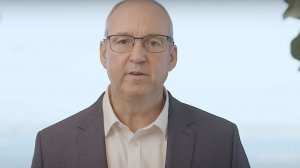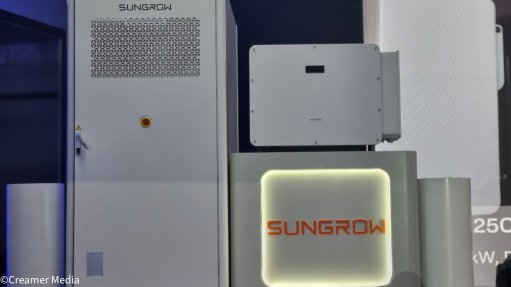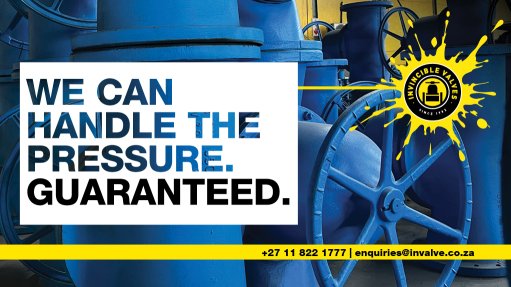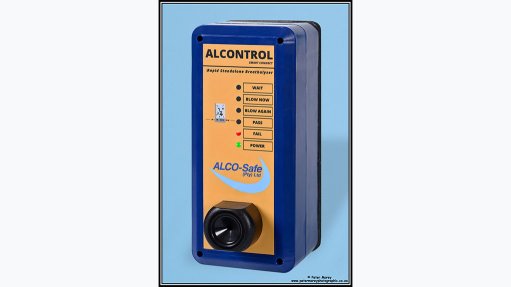South32’s future outlook has probably never looked brighter, CEO tells Mining Weekly

South32 CEO Graham Kerr interviewed by Mining Weekly's Martin Creamer. Audio: Creamer Media's Shadwyn Dickinson.
JOHANNESBURG (miningweekly.com) – The future outlook for South32, the mining and metals company spun out of BHP in 2015, has probably never looked brighter, says South32 CEO Graham Kerr.
“It's a decade in for the company, and time goes super quick in that space, but what I’d say is the exposure we have to high-quality operations, with growth in copper, zinc and the aluminium value chain, strongly sets us up for the world's transition to a low-carbon future,” Kerr outlined to Mining Weekly in an exclusive interview. (Also listen to attached Creamer Media audio.)
Accelerated low-carbon transformation has been a notable advance of this Sydney-, Johannesburg – and London-listed company, the operational Scope 1 and Scope 2 emissions of which decreased by 6% year-on-year and value chain Scope 3 emissions by 17% in the same period.
“One of the things we’ve really focused on, in the last three or four years, is the growth of our copper, zinc business, and the growth of our low-carbon aluminium business, because we think that’s going to play an important role in how the world decarbonises, the energy transformation.
“In the next couple of years, we've got growth in copper of 15%, and 6% in 2025 and 2026. Low-carbon aluminium growth is 17%, and 8% for 2025 and 2026. Then we have a series of projects in the medium term such as the fourth grinding line at Sierra Gorda, which is copper in Chile, the Taylor execution, which is zinc and potentially copper as well, in Arizona, US. We believe that positions us really well to go forward.
“With the sale of Illawarra Metallurgical Coal, we have a strong balance sheet which allows us to self-fund all those growth options while we’re rewarding shareholders, like we've done recently by starting our own market buyback again, with a board-approved $200-million.
“So, from my perspective, it's probably never looked brighter in terms of the future outlook,” Kerr posited.
SOUTH32 FINANCIAL RESULTS
South32’s financial results for the 2024 financial year were bolstered by an improved operating performance, cost management and higher prices for its key commodities in the latter half, which resulted in full-year underlying earnings before interest, taxes, depreciation and amortisation of $1.8-billion and underlying earnings of $380-million.
South African manganese production increased by 3% to a record 2.2-million wet metric tonnes in the year, and is expected to be two-million wet metric tonnes across full-year 2025 and full-year 2026, as South32 continues to use higher-cost trucking to optimise sales volumes and margins.
On the aluminium front, at Hillside in South Africa, a further 18% of pots were converted to AP3XLE technology, bringing the total to 36%. AP3XLE provides volume and efficiency benefits while reducing carbon intensity.
As aluminium produced at Hillside finds its way into European markets, making the operation greener to get around the Carbon Border Adjustment Mechanism (CBAM) is crucial.
Hillside supports more than 31 000 jobs directly and indirectly and contributes close to R10-billion to South Africa’s GDP.
In addition to Hillside, South32 also has two other aluminium smelters – Mozal in Mozambique, and the restarting Alumar in Brazil, but both of these are powered by hydro, which gives the aluminium produced by them vital green credentials.
Mining Weekly: How far is South32 from arriving at a decision on a power solution for Hillside Aluminium in Richards Bay?
Kerr: What we’re working on with the South African government at the moment is to try and find a way to get the Hillside to a low-carbon aluminium smelter as well. Internally, we have a target to halve our Scope 1 and Scope 2 emissions by 2035, of which the biggest generator of our Scope 2 emissions is actually Hillside. We’ve been working in that space with Eskom and the South African government on the possibility of adding more and more renewables. We’re looked at it individually and just went out with a big request for information – RFI – recently. The positive news was the cost of solar and wind has dramatically come down and economically makes a lot of sense. The challenge for the smelter is that it needs power when there's no wind and there's no sun, which means, therefore, you rely on Eskom to provide the firming power, and that's not a very economical solution for us or Eskom when that power's in reserve. So, what we're trying to work on now with Eskom is how do some of those renewables, wind, solar and the current nuclear allocation, feed into the broader network to ensure the long-term sustainability of Hillside. Now, we've got a bit of time to get this right. The current power contract finishes in 2031, but we, in public disclosures, have talked about halving our emissions by 2035. So, roughly, we've got 11 years to get this right, but we're super invested because we think Hillside is an important part of South Africa's economy, is very important from a social and labour and jobs perspective, and certainly is a world-class smelter that has many decades of operation ahead.
Have any new steps been taken towards the production by South32 of manganese sulphate for supply to the battery makers of battery electric vehicles?
Great question, and that is a piece of technology that is shifting, where people are exploring more and more about using manganese in EV batteries, and that's driven by the density, charge, the costs, the durability, etcetera. We have two producing mines, one at Gemco in Australia that's currently been impacted by a cyclone, and the other in the Kalahari, which is the world's largest basin of manganese. One of the challenges in South Africa is, while the cost of production in terms of labour and equipment etcetera is competitive, there’s a long distance from the mines to the port, and a long distance from the port to the customer. Our focus in the short term in the Kalahari is on getting that transportation train to be as effective and as efficient as it can be, so we’re working with Transnet and also doing some of our own enhancements around capital expenditure to get our utilisation up. That's probably our primary focus there.
We have been doing some other testwork on a manganese deposit we have in the US around: could we convert that to battery technology? That would allow us for some optionality to later look at Gemco and Hotazel Manganese Mines – HMM. But that's probably the primary focus at the moment, because there's also a fair bit of support in the US to help develop anything which they call a critical mineral, which manganese is in the US.
When is the disposal of the Metalloys ferromanganese plant likely to be concluded?
We announced that transaction a while ago, and it's got a couple of conditions precedent that have to be completed. Some of those rely on the environmental government being comfortable with that process. That's something we're working with at the moment and that's probably about 12 months away from being finalised.
Is the South African public-private railway line collaboration pointing to the railing of manganese becoming more efficient and more cost competitive going forward?
To be brutally honest, it has been a challenge over the last probably two or three years. Clearly, some hits from Covid, which were difficult to recover from, and then there are well-documented issues around maintenance, efficiency, etcetera, on the Transnet side. What I would say is the new management in Transnet has been very open, been very focused on what they need to do to improve their side, and it's actually been super refreshing. We've found the new team’s got exactly the right plan and is super engaging, so we are seeing little signs of improvement. Few challenges at the moment around Port Elizabeth with congestion, but we have a lot of confidence in the current management team that they can turn this around. That then builds some credibility around doing more together, and that's something we're open to absolutely exploring.
I think the counter that we would have to manage is the decision made under previous management to give 15% of the current rail allocation to juniors to try and help them support their business. We have no problem with that if you're growing the rail. The challenge we have is we lose 15%, we've got to go on the road, which obviously impacts the economics. That's the kind of policy I think that Transnet needs to get tighter on – grow the actual size of the network, and then you can allow more and more people to get on there.
TRANSNET LOAN AGREEMENT
The New Development Bank (NDB) on Friday signed a R5-billion loan agreement with South Africa’s State-owned freight transport and logistics group Transnet. The agreement was signed during the NDB’s ninth yearly meeting, held in Cape Town.
The South African government will guarantee the loan for Transnet’s freight rail sector renewal programme, which aims to restore freight rail volumes in South Africa. This includes infrastructure renewal, locomotive overhaul and wagon fleet renewal workstreams.
“We need to fix the network,” Transnet CEO Michelle Phillips told Mining Weekly Online following the signing ceremony. “And we have a long way to go to do that.” Phillips added that the network was in “a terrible state”.
“We have a lot to do to lift it to the standard where everyone can use it – us and private operators.”
“This loan underscores NDB’s commitment to supporting sustainable development and economic growth in South Africa,” noted NDB president Dilma Rousseff.
Article Enquiry
Email Article
Save Article
Feedback
To advertise email advertising@creamermedia.co.za or click here
Comments
Press Office
Announcements
What's On
Subscribe to improve your user experience...
Option 1 (equivalent of R125 a month):
Receive a weekly copy of Creamer Media's Engineering News & Mining Weekly magazine
(print copy for those in South Africa and e-magazine for those outside of South Africa)
Receive daily email newsletters
Access to full search results
Access archive of magazine back copies
Access to Projects in Progress
Access to ONE Research Report of your choice in PDF format
Option 2 (equivalent of R375 a month):
All benefits from Option 1
PLUS
Access to Creamer Media's Research Channel Africa for ALL Research Reports, in PDF format, on various industrial and mining sectors
including Electricity; Water; Energy Transition; Hydrogen; Roads, Rail and Ports; Coal; Gold; Platinum; Battery Metals; etc.
Already a subscriber?
Forgotten your password?
Receive weekly copy of Creamer Media's Engineering News & Mining Weekly magazine (print copy for those in South Africa and e-magazine for those outside of South Africa)
➕
Recieve daily email newsletters
➕
Access to full search results
➕
Access archive of magazine back copies
➕
Access to Projects in Progress
➕
Access to ONE Research Report of your choice in PDF format
RESEARCH CHANNEL AFRICA
R4500 (equivalent of R375 a month)
SUBSCRIBEAll benefits from Option 1
➕
Access to Creamer Media's Research Channel Africa for ALL Research Reports on various industrial and mining sectors, in PDF format, including on:
Electricity
➕
Water
➕
Energy Transition
➕
Hydrogen
➕
Roads, Rail and Ports
➕
Coal
➕
Gold
➕
Platinum
➕
Battery Metals
➕
etc.
Receive all benefits from Option 1 or Option 2 delivered to numerous people at your company
➕
Multiple User names and Passwords for simultaneous log-ins
➕
Intranet integration access to all in your organisation



















